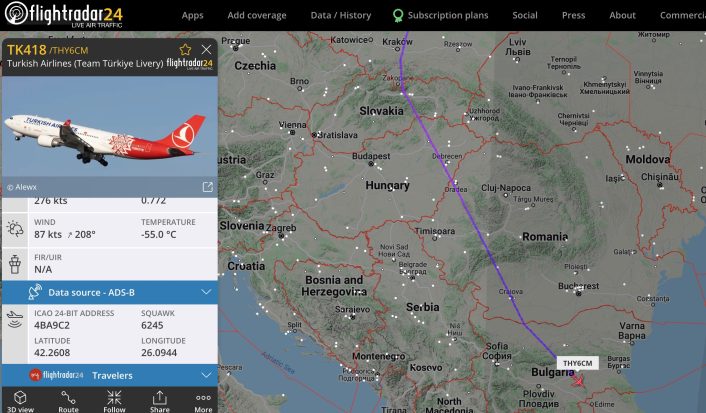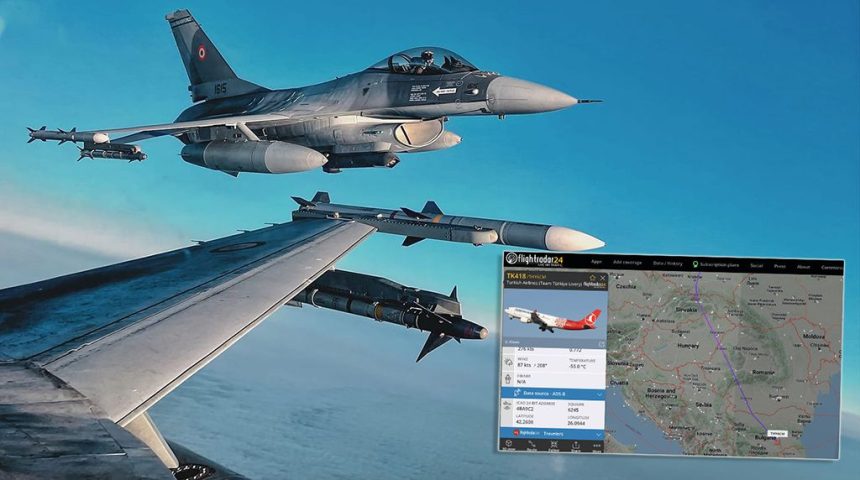The Romanian Air Force F-16s in QRA (Quick Reaction Alert) were scrambled to intercept a Turkish A330 today. Turkish Airlines and Air Serbia, the only airlines to allow passengers to travel between Russia and Europe, have been exposed to a string of bomb threats recently.
The F-16s of the Forţele Aeriene Române (Romanian Air Force) carried out an air policing mission on Mar. 22, 2022, when the QRA jets were launched to intercept and escort a civilian aircraft inside the Romanian airspace after a bomb threat was called in for a Turkish Airlines flight from Moscow to Istanbul.
The Romanian interceptors took off at 17:58 local time, intercepted the civilian aircraft and escorted it to the borders of the national airspace, in accordance with the legislation and procedures. The airliner left the Romanian airspace at 18:24 LT. The A-Scramble (Alert Scramble) was ordered by the NATO Combined Air Operations Centre at Torrejon, Spain, and coordinated nationwide by the Center for Reporting and Control of the Romanian Aviation Component Command, in coordination with civil air traffic authorities.
Although the Romanian Air Force did not disclose any additional detail about the aircraft interested by the security threat, a quick analysis on the flights from Moscow to Istanbul allowed us to identify the Turkish Airlines flight as being THK418, an Airbus A330-200 registered TC-JNB, that took off from Moscow International Airport at 13.35 UTC and safely landed at Istanbul at 17.15 UTC.
Based on the data made available by Flightradar24.com, the A330 entered the Romanian airspace at FL370 and then descended to FL330 flying at a speed of 430 knots throughout the crossing.

Interestingly, the one today, was the second scramble for a bomb threat in just three days for the Romanian Air Force. In fact, on Mar. 19, the QRA F-16s were launched to intercept and escort a WizzAir flight from Kutaisi (Georgia) to Warsaw (Poland), following the information of the authorities Civil air traffic about a bomb alert aboard the aircraft.
The Romanian F-16s took off at 22:44 LT and, after interception, they escorted the civilian aircraft until it left the national airspace at 23:33 LT. At the Romanian-Hungarian border, the WizzAir A321 was taken over by the Hungarian Air Force Gripens that escorted it out of the Hungarian airspace, where the Slovak Air Force took over. The airliner landed safely at Warsaw airport after 23.00LT. Nothing dangerous was found aboard the airplane by the police (as it almost always happens).
Noteworthy, the WizzAir one, was the second bomb threat the Hungarian Air Force had to deal with in less than a week. On Mar. 14, the Hungarian Gripens were scrambled to intercept an Air Serbia Airbus A319 from Belgrade to Moscow after air traffic control was told that the plane was carrying a bomb. The HuAF JAS 39s identified the A319 and escorted it outside Hungary’s airspace towards Serbia, remaining in flight near the border until the Serbian flight safely landed.
Bomb threats are reported all around the world every now and then (almost always resulting in false alarms). They have multiplied in the last few days amid growing tensions in the region following the Russian invasion of Ukraine, the subsequent war and the various sanctions on Moscow. Turkish Airlines and Air Serbia, the only airlines that allow passengers to travel on a single ticket between Russia and Europe, are particularly exposed to such threats, in what analysts consider a possible attempt to disrupt the operations of those carriers that have not cancelled flight to/from Russia.









